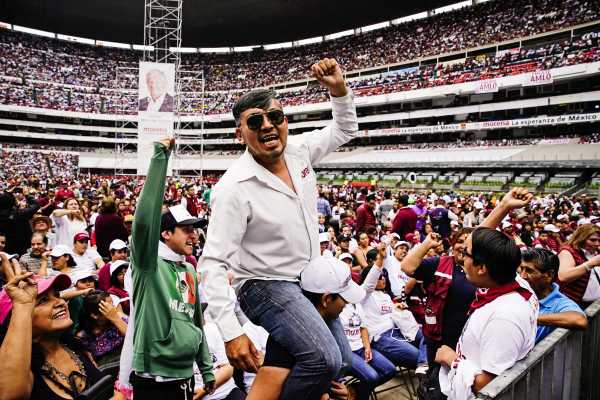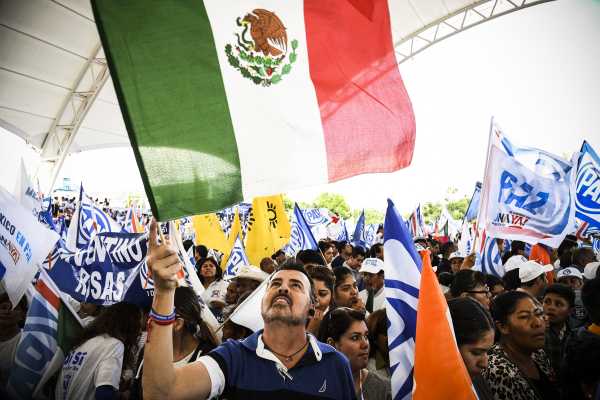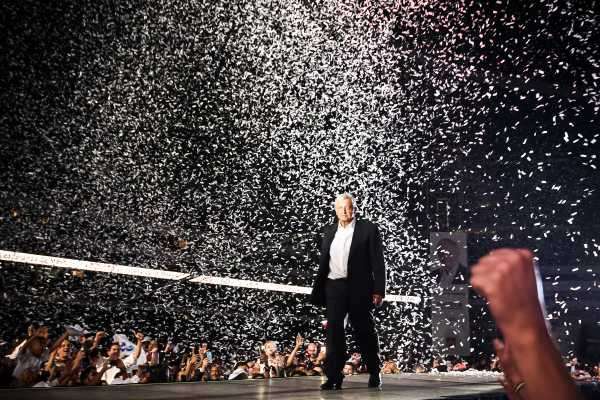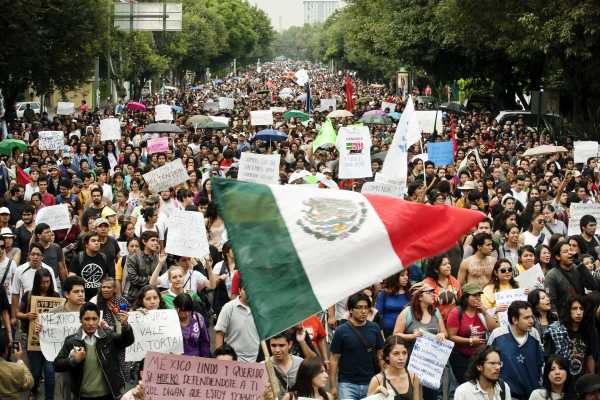
Mexican voters are heading to the polls to elect their next president on Sunday — and if the frontrunner secures a win, Mexico could soon have a leftist, populist, nationalist president in power.
Polls have projected that Andrés Manuel López Obrador, 64, will likely win the presidential election. He’s currently an average of 20 points ahead of his three rivals and he’s had a strong lead for months. López Obrador is running for the recently formed left-wing Morena party with promises to reform the country’s widespread corruption and massive crime rates.
Experts say Mexican citizens are ready for sweeping changes throughout the country, especially since current President Enrique Peña Nieto, who is a member of the Institutional Revolutionary Party (PRI), has largely taken a soft stance on corruption.
This will be the largest election in Mexico’s history — more than 3,400 seats are open at the local, state, and federal levels. In addition to the president, Mexican voters will elect 128 members of the country’s Senate and 500 members of the Chamber of Deputies, Mexico’s house of representatives.

And with thousands of seats open, politicians running at the local level have especially seen a massive amount of violence and brutal murders. Since they’re more accessible, they’ve become targets of local organized crime groups.
But the presidential election seems to be getting the most attention, especially because López Obrador has promised huge changes for the country’s future.
Here’s what you need to know for Mexico’s upcoming election day.
The presidential frontrunner is a leftist nationalist candidate
Obrador’s significant lead over his three rivals is largely due to voters who are desperate for reform. Pablo Piccato, a professor at Columbia University who specializes in Mexican history, told me that “voters in general seem to be fed up with the government in a way that wasn’t there before the first two times he ran. There’s disappointment with democracy in general.”

But López Obrador (who is often referred to by his initials, AMLO) is certainly the most left-leaning candidate, and has promised to battle inequality and take on corruption.
“No one should be worried if I use the word ‘radical,’” López Obrador said at a rally in Jiutepec earlier this month. “I use radical in the sense of coming from root. Because I want to uproot corruption and injustice.”
He’s run for president twice, losing both times in 2006 and 2012; he also served as the mayor of Mexico City from 2000 to 2005.
López Obrador’s three rivals include conservative National Action Party candidate Ricardo Anaya, member of the governing PRI party José Antonio Meade, and independent Jaime Rodríguez Calderón.
López Obrador’s main contender is Anaya, yet many voters are skeptical of him because of his alleged corruption scandals. He’s been accused of money laundering and benefitting from a fraudulent real estate deal involving a network of shell companies. Anaya denies these claims.

And although Meade is seen as a capable candidate, the public is skeptical of his party, especially since Mexico’s current president, who is also a member of the PRI party, failed to live up to their expectations. Calderón is currently in last place in the polls.
All four candidates have one thing in common, though: They really, really don’t like US President Donald Trump. The candidates have all promised to take a hard stance on Trump’s aggressive politics, while still working closely with the US to promote economic growth. That could be key for a potential renegotiation of the North American Free Trade Agreement (NAFTA), which Trump has been critical of recently.
Although López Obrador has spoken favorably about NAFTA, critics have argued that his nationalist attitude could bode ill for the future of the agreement. Some speculate that if Trump pulls out of NAFTA, he might not fight for the deal.
At a presidential debate last month, the candidates all called for a strong relationship with the US but also made it clear that they would stand up to Trump’s aggressive bullying tactics.
“You can’t appease tyrants and bullies. You have to confront them,” Anaya said at the debate in Mexico City.
Put together, all of this indicates that Mexican voters want a strong president who will stand up to world leaders like Trump and fix Mexico’s corruption problem. But it’s going to be difficult, especially given the crimes that continue to plague the country.
This is set to be the largest election in Mexico’s history. And there’s been a lot of bloodshed.
This election will shape the future of Mexico, and there’s been no shortage of violence surrounding it.
At least 130 politicians, including 48 candidates, have been brutally murdered since the start of the election season last September, according to Etellekt, a Mexican political consulting agency. Earlier this month, three women political candidates were shot dead in just 24 hours.
Experts say the wave of violence is likely the result of organized crime groups trying to gain control and manipulate local government officials. Piccato told me municipal governments are especially vulnerable because they often “don’t have the means to deal with organized crimes.”
Ruben Salazar, director of Etellekt, told AFP that the crackdown on drug cartels has driven the political violence. “The new cells that emerge … get rid of the [politicians] they don’t manage to strike a deal with,” Salazar added.
And even though the presidential election is getting most of the attention, Eric Olson, deputy director of the Wilson Center’s Latin American program, told me it’s actually rare for high-profile presidential candidates to be targeted by organized crime groups.
“Presidential candidates are vulnerable, but they’re surrounded by people and there’s constant attention, so only in the most extreme and unusual situations would a criminal organization go after a presidential candidate. They’re more concerned about local authorities,” Olson said.
The attackers have been unknown assailants who have largely escaped prosecution. The number of murders leading up to Sunday is startling, but less shocking given Mexico’s history of violence. Last year, the country’s murder rate reached its highest levels ever recorded at 29,168 homicides, according to preliminary government data.
Buzzfeed News reported that around 600 candidates have already backed out of their races. But if the bloodshed represents anything, it’s that the stakes are high.
There’s a lot at stake — and corruption reforms likely won’t be easy
If frontrunner López Obrador wins the election on Sunday, that could mean serious sweeping reforms the country. It would be a major shift from the PRI’s rule under Peña Nieto, who failed to improve Mexico’s massive corruption problem.
Peña Nieto ran and won as PRI’s candidate in the 2012 presidential election. At the time, he was seen as a fresh face for the stained PRI party because he advocated for transparency and accountability, managing to beat out then-runner-up López Obrador.
That didn’t work out well for him.
Peña Nieto’s term has been mired with murky scandals, sparking backlash against the PRI party. When he was elected in 2012, Peña Nieto had an approval rating of 54 percent; that dropped to 17 percent in January 2018.

So now Mexicans are tired of the government’s wrongdoings. This basically means that, if López Obrador secures a win on Sunday, voters will expect a lot out of him and likely hold him accountable for his promises.
But it will take substantial time and work to mend Mexico’s deeply corrupt system. And it will be a huge challenge for López Obrador if he wins.
“He doesn’t have a very precise plan,” Piccato said. “The president might be very honest, and by all indications López Obrador is a very austere and honest guy. But what happens underneath, at the level of the bureaucracy, the municipal governments, the state government — that’s going to be very difficult to control.”
Yet it seems Mexican voters believe that if anyone can bring about these changes, López Obrador is the best bet.
The outcome of the presidential election could also affect the relationship between the US and Mexico. Jason Marczak, director of the Atlantic Council’s Adrienne Arsht Latin America Center, told me that López Obrador was a “strong nationalist,” but he will still probably try to work closely with the US on certain issues.
“Especially around the recent imposition of the steel and aluminum tariffs on Mexico, his response was that the Mexican president should have found more opportunities to sit down and talk with President Trump,” Marczak said.
In other words, the results of Mexico’s election on Sunday could mean massive changes for the country. And the presidential winner will likely be under immense pressure to fix Mexico’s corrupt system and widespread violence.
Sourse: vox.com





